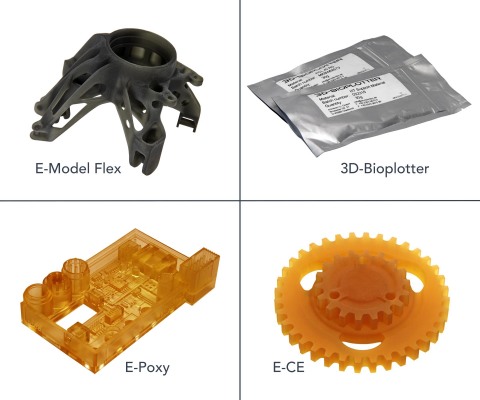- Three new engineering-grade materials for the company’s Desktop, Perfactory and 3SP line of 3D printers.
- First-ever line of EnvisionTEC bioprinter materials, with four new materials for fabricating scaffoldings and supports
- New products from expanded materials R&D team in Montreal show increased investment in material development
DEARBORN, Mich. — (BUSINESS WIRE) — May 8, 2017 — EnvisionTEC, a leading global manufacturer of desktop and full-production 3D printers and materials, today unveils its first-ever line of research-grade materials for its 3D-Bioplotter Series printers as well as three new engineering-grade materials for industrial customers.
This Smart News Release features multimedia. View the full release here: http://www.businesswire.com/news/home/20170508005225/en/

EnvisionTEC is launching seven new materials at RAPID + TCT in Pittsburgh. That includes four new research-grade materials for its 3D-Bioplotter and three new engineering-grade materials for its Desktop, Perfactory and 3SP printers. (Photo: Business Wire)
With the broadest portfolio of additive manufacturing technologies in the world, EnvisionTEC is already recognized as having one of the most diverse portfolios of 3D printing materials on the market, including materials approved in the United States and Europe for medical use in the body. In all, EnvisionTEC now offers more than 170 materials, which come in a range of functionalities and colors.
Parts printed in the new materials will be on display this week in Pittsburgh at RAPID + TCT, the premier event for 3D manufacturing in North America. EnvisionTEC also will be celebrating its 15th year anniversary and showcasing other machine and material innovations in booth 1813.
“These new offerings showcase our commitment to material development as well as our close relationships with customers, who have asked us to develop specific materials for our highly accurate and reliable desktop and production machines,” said CEO Al Siblani.
EnvisionTEC’s growing material R&D team is led by Dr. Vadim Nazarov, who studied photochemistry with renowned 3D printing expert Jean-Claude André of the French National Center for Scientific Research before joining EnvisionTEC in 2003.
Engineering-Grade Materials
Three new industrial materials are now available for users of EnvisionTEC’s Desktop, Perfactory and 3SP printers. The company’s 3SP technology, first unveiled in 2013, offers a fast and unique vat photopolymerization method in large build envelopes up to 18 x 18 x 18 inches. The new materials include:
- E-CE, a stiff, heat-resistant material that offers chemical resistance and is comparable to other cyan-type ester materials in the 3D printing market. With a heat deflection temperature of 170°C, E-CE is perfect for industrial applications that require thermal stability such as electronics encasements and under-the-hood parts. Compatible machines: Desktop, Perfactory.
- E-Poxy, a partially biosourced, tough, dual-cure material that delivers strong, thin-walled final products. E-Poxy offers a good relationship between flexibility, hardness and heat resistance that is also ideal for connectors. Compatible machines: Desktop, Perfactory.
- E-Model Flex, a highly accurate modeling and end-use material with improved elongation at break that will be offered in yellow and green. Compatible machines: Desktop, Perfactory, and 3SP.
New Bioprinter Materials
What’s more, EnvisionTEC will also be launching its first-ever line of materials for the 3D-Bioplotter. That includes:
- Silicone TG, a technical grade silicone for building soft implant surgical models such as noses and breasts at room temperature. This RTV-1 silicone, available in transparent, black or shades of gray, will cure by itself within a few hours under the influence of atmospheric moisture and displays low shrinkage, a medium hardness of about 20 Shore and is odorless during printing. An excellent material for relatively large parts made on the 3D-Bioplotter.
- PCL 45K RG, a Research Grade (RG) polycaprolactone (PCL) for tissue engineering applications. Mechanical stability of PCL objects are controlled by the porosity design of the part. An outstanding candidate for both bone and cartilage regeneration, as well as drug delivery. The surface erosion of the material allows for controlled release of additives during the 1-3 year degradation period of the fabricated parts.
- LT Support RG, a low-temperature research grade saccharide material derived from cellulose that is used for sacrificial supports. It can be processed as a hydrogel and dissolved in distilled water after the support for the 3D build project is no longer needed. Biocompatible and cell friendly, this material does not negatively affect final object’s biological properties. Processing temperature is 23°C.
- HT Support RG, a high-temperature research grade sugar derivative material that is also used a sacrificial support material. This biocompatible material can be dissolved in distilled water at room temperature within a few minutes. Processing temperature is 150°C.








